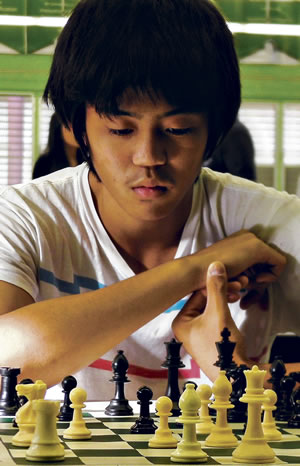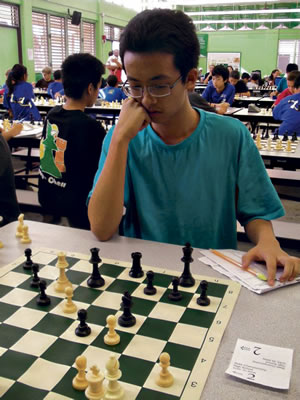Teens Win State Chess Championships
Eldon Nakagawa of Aiea and Stephen Mau of Mililani shock the chess world by winning state titlesHistorically, the game of chess has been imbued with the notion of nobility. It has been stereotyped as so difficult that only those of supreme intelligence can master it.
Well, hold your rook right there!
Chess is merely a game, fashioned for entertainment and positive mind stimulation. Before 16-year-olds Eldon Nakagawa and Stephen Mau became two of Hawaii’s finest chess players, they were just as uncertain about chess as anyone else who is just learning the more than 1,000-year-old game of strategy.
Nakagawa and Mau began playing chess while in elementary school, their interest piqued mostly by curiosity.
“I actually started playing because someone at school asked why I don’t know how to play chess,” says Mau, a senior at Mililani High School. “I guess I was one of the top students in my class, and they associated chess with intelligence. I didn’t know how to play, so I asked my dad and he taught me, and I started playing with him for awhile.”
Nakagawa, a junior at Aiea High, would get irritated at his mother for beating him consistently when he was younger.
“I eventually beat her. She made me play my dad, to punish me, I guess,” says Nakagawa with a smirk.
“I lost to him a lot. Then I started beating him and they sent me to chess clubs. I got a few lessons from Chet Gianson, who recommended I start playing in tournaments.”
This past September, Nakagawa became the youngest player to win the Hawaii State Chess Open Title. Going into the final round with a perfect score – a feat in and of itself – Nakagawa was paired against six-time state champion, national master and scholastic chess coach Cornelius Rubsamen.
In his toughest competition thus far in tournament play, Nakagawa played as he always does, with a step-ahead mentality, finishing the event victorious.
“At first, I was taking it match by match because I didn’t really think I was going to do as well as I did. Then, as the tournament progressed, I started pressuring myself unnecessarily. That wasn’t good, but I guess it’s natural.”
On playing Nakagawa, Rubsamen says, “Having seen Eldon grow as a chess player over the years, and having played my part in training him, I was not surprised that I couldn’t beat him in that critical game. The combination of talent and work ethic has evidently paid off.”
Ratings for chess players range from Class C to Class A and up and through expert rank, with the highest being grand-master. Nakagawa, who currently holds the rank of expert, could very well become the youngest chess master from Hawaii.With a sound understanding of the game, he’s mulling his strategy well before each match begins.
“You have to evaluate the positions, and if you already have a plan, then you have to try to further your plan. Chess is a war game, so you have to plan and out-plan your opponent,” says Nakagawa, who also won a Brilliancy Award for best-played game at the Vancouver, Wash., Denker Tournament.
Mau, who placed second in the Open Title tournament, likes to speed things up a bit. He recently took first place in the Hawaii State Blitz Chess Championship. In blitz chess play, participants have only five minutes to make each move as opposed to standard play, where players have 15 minutes or more, depending on the tournament.
Unlike Nakagawa, Mau uses a more unconventional approach to tournament play.
“I don’t have all these documents on my opponents. I just go to the board and I play,” he says. “I try to pretend my opponent is the best player in the world, and if I let him off the hook, then he is going to find some crafty way to get out of it, so if I just pretend he is the best, then I’ll have total focus on him.”
You would think that, with the skill Mau and Nakagawa have gained at chess, they would be practicing day in and day out, but that is hardly the case, as both have daily schedules constantly filled with school as well as extracurricular and sport-related activities.
Nakagawa participates in the Robotics and Math clubs, jazz band, as well as playing on the tennis and swimming teams at Aiea High. Mau squeezes time in for chess between Science and Math clubs, Interact club and a handful of networking competitions.
So, who is the better chess player?
In head-to-head play, Mau and Nakagawa say recently they’ve had a series of draws between them, and that each has always had great difficulty beating the other.





